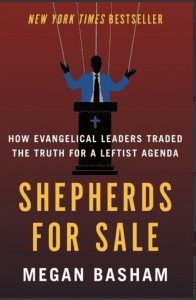In this episode of the Theology and Ethics Podcast, The Kirkwood Center interviews Christian author, cultural commentator, and Patheos blogger, Bethel McGrew (Young Fogey) about a recent book: Shepherds for Sale: How Evangelical Leaders Traded Truth for a Leftist Agenda, by journalist Megan Basham. In part #1 of this two-part discussion, we tackle various aspects of Basham’s book, to include responses by her critics and whether or not Basham successfully makes the case that leftist politics has corrupted Evangelical teaching and practice.
Some Initial Thoughts On Corrupt Shepherds
The Scriptures tell us:
The word of the Lord came to me: 2 Mortal, prophesy against the shepherds of Israel: prophesy, and say to them—to the shepherds: Thus says the Lord God: Ah, you shepherds of Israel who have been feeding yourselves! Should not shepherds feed the sheep? 3 You eat the fat, you clothe yourselves with the wool, you slaughter the fatlings; but you do not feed the sheep. 4 You have not strengthened the weak, you have not healed the sick, you have not bound up the injured, you have not brought back the strayed, you have not sought the lost, but with force and harshness you have ruled them. 5 So they were scattered, because there was no shepherd; and scattered, they became food for all the wild animals. 6 My sheep were scattered, they wandered over all the mountains and on every high hill; my sheep were scattered over all the face of the earth, with no one to search or seek for them.
7 Therefore, you shepherds, hear the word of the Lord: 8 As I live, says the Lord God, because my sheep have become a prey, and my sheep have become food for all the wild animals, since there was no shepherd; and because my shepherds have not searched for my sheep, but the shepherds have fed themselves, and have not fed my sheep; 9 therefore, you shepherds, hear the word of the Lord: 10 Thus says the Lord God, I am against the shepherds; and I will demand my sheep at their hand, and put a stop to their feeding the sheep; no longer shall the shepherds feed themselves. I will rescue my sheep from their mouths, so that they may not be food for them.
Ezekiel 34:1-10
Although I have not read Basham’s book myself, the pattern of ecclesial drift Basham seeks to expose is one that has been repeatedly illuminated by past biblical and cultural commentators. The idea of the church becoming corrupted over time through a top-down process is one that biblical scholars, like Yehezkel Kaufmann, as well as theologians, like H. Richard Niebuhr, pointed out in their own day.
As to the biblical data itself, Kaufmann concluded that the corruption of the religion of Israel was almost exclusively one that started at the very top of the social and economic stratosphere, i.e., that came through the royal houses:
During the 210 years of the northern kingdom (931-722) a public cult of a foreign god was practiced under royal sponsorship for about twenty years. During the 426 years of the southern kingdom (1011-586) a public cult of a foreign god was practiced only during the days of Athaliah and Manasseh, and to a lesser extent at the end of Solomon’s reign and in the time of Ahaz. These paganizing interludes appear solely as products of royal initiative. Revolts against them are popular undertakings that are led by the zealots of YHWH. The people are never found on the side of the defenders of paganism.
Y. Kaufmann, The Religion of Israel, 141
When it comes to modern times, Niebuhr came to a similar conclusion. Speaking of the “Christ of Culture” Christian who sees little to no “tension” between “church and world,” “social laws and the Gospel,” or “the workings of divine grace and human effort,” (83) Niebuhr says this with regard to the social position of these types of Christians:
The cultural Christians tend to address themselves to the leading groups in a society, they speak to the cultured among the despisers of religion; they use the language of the more sophisticated circles, of those who are acquainted with the science, the philosophy, and the political and economic movements of the time. They are missionaries to the aristocracy and the middle class, or to the groups rising to power in a civilization.
H. Richard Niebuhr, Christ and Culture, 104
Examples could be multiplied about how the social elite in the Church get coopted by the secular “aristocracy” in culture and, so doing, become agents of heterodoxy and heteropraxy in the Church. This is usually resisted by the “am ha’aretz” or “people of the land,” who naturally hang on to the traditional teachings of the Church, or community of God, and yet who wind up victims of the social elite. In today’s political language it is these ordinary Christians who get derided as “deplorable,” and who are treated as second-class citizens within the Church: unsophisticated, undereducated, and fanatical. According to Niebuhr, these average Christians are treated as the “vulgar herd” of Christianity.
One of the main questions I addressed with McGrew in this podcast is just this: has Basham successfully demonstrated that this has happened in the Evangelical (especially Southern Baptist) churches in America? And if so, by whom, to what end, and to what extent? Here’s the link to the episode:
https://podcasts.apple.com/us/podcast/theology-ethics/id1771334508?i=1000674685968

Bethel McGrew is a freelance writer, teacher, maths Ph.D., cultural critic, bad Anglican. You might have spotted her at World, National Review, First Things, The Spectator, The Critic, Plough, or someplace else.












